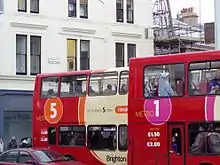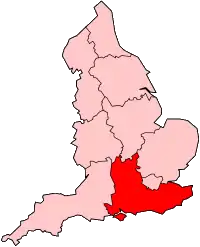Brighton & Hove (bus company)
Brighton & Hove[1] operates most bus services in the city of Brighton and Hove in southern England. It is a subsidiary of the Go-Ahead Group.
 | |
.jpg.webp) | |
| Parent | Go-Ahead Group |
|---|---|
| Founded | 1884 |
| Headquarters | Hove |
| Service area | West Sussex East Sussex Kent |
| Service type | Bus services |
| Destinations | Brighton and Hove Eastbourne Lewes Shoreham-by-Sea Steyning Tunbridge Wells |
| Fleet | 326 (August 2016) |
| Website | www.buses.co.uk |
History
Brighton & Hove was established in 1884 as Brighton, Hove and Preston United Omnibus Company. In 1916, Thomas Tilling took over the company and replaced all its remaining horse buses with motor buses.[2] In November 1935 it was formed as the Brighton Hove and District Omnibus Company.[1] In January 1969 it merged with Southdown Motor Services as a subsidiary of the National Bus Company. In January 1985 in preparation for privatisation, Brighton & Hove was separated from Southdown. In May 1987 it was sold in a management buyout. In November 1993 Brighton & Hove was sold to the Go-Ahead Group.[3][4]
Operations and routes

.jpg.webp)
The company's routes cover a large area encompassing the whole of the city, some parts of West and East Sussex and a single route into Kent. There are 40 separately-numbered standard routes. Frequencies range from every 5 minutes to two journeys per day. In addition, there are nine night bus routes and 19 school bus routes. In September 2005, the company took over many routes previously operated partly or entirely by Stagecoach South, the best example being the Coaster services 12 and 13X to Seaford and Eastbourne.[5]
The company operates from three depots: Conway Street, Whitehawk and Lewes Road. Conway Street also serves as the company's headquarters. The company also has four outstations in Newhaven, Eastbourne, Uckfield and Durrington.
Metro services

During 1996/97, five of the most popular routes (1/1A, 5/5A/5B, 7, 25 and 49) were enhanced with new buses and individual route branding. All five routes offer regular services, modern buses and a wide range of connections throughout the centre of Brighton and Hove, reinforced by a colour-coded diagrammatic map [6] Since 2004, Brighton & Hove have gradually introduced new buses to the Metro routes, the majority being Scania OmniDekkas. In April 2011, Metro 7 was removed from the Metro network and rebranded as Route 7 with brand new Wright Eclipse Gemini bodied Volvo B9TLs operating on the route. The last Metro branded buses in service were the Scania OmniCity double deckers delivered in 2009, mostly operating on Metro 5. The final few examples of Metro branding were removed in October 2013.[7]
The Regency Route
The Regency Route (29) is one of Brighton & Hove's branded routes. It began as route 729 by the nationalised Southdown Motor Services subsidiary of the National Bus Company, of which Brighton & Hove was a part, and the route was part of the NBC's cross-country "Stagecoach" network. It runs from Churchill Square to Tunbridge Wells, using specially-branded Scania OmniDekkas, which have high-backed Fainsa seats. Route 29 runs half-hourly, with one bus per hour serving Isfield and the other running via Rose Hill between Lewes and Uckfield. Route 28 follows the same route from Brighton to Lewes, with a service every half-hour just to Lewes and an alternate service every half-hour to Ringmer, providing a combined service every 10 minutes between Brighton and Lewes.
Competition
Brighton & Hove face limited competition on some of its network of routes. The Big Lemon bus operator, a community interest company founded in 2007 who used to run a route between the University of Sussex and central Brighton, is the largest competitor. It was set up in an effort to make Brighton and Hove's public transport options more sustainable by using biodiesel collected by the company from businesses around the city as well as offering private hire services.[8]
The Big Lemon originally operated an express service numbered 42X which ran from Brighton station to Falmer station using elderly step entranced buses. However the service was dropped in December 2007. A relaunch of the service commenced in early 2008 numbered 42. In 2010 the company started two more services, 43 and 44. However just months after it began route 43 ended due to low passenger numbers. In 2011 The Big Lemon faced competition from Brighton & Hove Buses in that Brighton Buses lowered its fares to match fares charged by The Big Lemon. In January 2012 The Big Lemon stopped running route 42 and continued to run route 44 only, split into two shuttles numbered UB1 and UB2.[9] The Big Lemon subsequently ceased operation of these services, and shuttle UB1 is operated by the University of Brighton.[10]
Other companies which run into the city include Metrobus, which operates routes 270 (to/from East Grinstead), 271, 272 and 273 (all to/from Crawley, with the former two also serving RSC Hospital), as well as Stagecoach South which runs route 17 Horsham to Churchill Square and route 700 Portsmouth to Brighton.
Subsidies
Under the Transport Act 1985 Brighton and Hove City Council has the authority to put out to tender contracts (>5 years) to fill gaps in bus availability that arise due to lack of profitability. For example, the 81, 81A and 81C buses are subsidised, depending on route, from .03p (based on operations Monday – Saturday services) up to £1.32 (based on Winter Sunday evening services) for each fare bought.[11] The council is also obliged to subsidise school bus routes. For example, the 91 Cardinal Newman School bus is currently subsidised at £4.10 per single journey.[11]
Brighton & Hove Bus and Coach Company operates the majority of the contracts.[11]
| Year | Subsidy |
|---|---|
| 2011–12 | £1,177,600 |
| 2010–11 | £1,140,200 |
| 2009–10 | £1,236,800 |
| 2008–09 | £1,340,000 |
| 2007–08 | £1,143,600 |
Fares and ticketing
The company operates, to a large extent, a flat fare system – people can travel on almost all of its buses, and to almost everywhere on its network, for fixed prices. The CitySaver ticket allows people to travel as often as they want for one day anywhere on any combination of buses, with a few exceptions. There are also longer-period season tickets, there are tickets valid also with local rail services and other bus operators, and various concessions for students, people under 16, passengers boarding at Brighton Station and several others .[13]
In late 2011 the company started to introduce "the Key", a smart card system, in a bid to curb ticket sharing and speed up boarding times. The new system has yet to prove itself with many older people and foreign students needing direction on how to actually use "the Key". It can also be used on some local train journeys.[14]
Contactless payments were first made available in November 2018[15] as a method for payment, and in September 2019, the company piloted the first tap-on, tap-off contactless scheme in the UK alongside its sister company, Metrobus, with aims to improve boarding times and make travelling convenient.[16]
Named buses

Many of the company's buses have the name of a famous person commemorated on the front.[17]
In 1999 the company ran a competition asking local residents to name the 20 new double-decker buses that had just been added to its fleet. The company had started with names such as Brighton Belle, Brighton Rock, Brighton Pier, Brighton & Hove Albion, Hove Actually[18] and Brighton and Hove in Bloom, and then asked local residents for help. It considered the options of naming the buses after landmarks in the town, people from the past, and present day celebrities with local connections.[19]
In April 2004 the company added another 18 buses to its fleet, and continued the practice of naming them. The company's stated rule for choosing the name was: "The nominations must have made a significant contribution to the life of the local area during their lifetime and must have since died."[20] However several living people are in fact featured on the bus fronts.
In September 2005 the company added a further 19 buses to its fleet, naming them after people who had "made great contributions to the city" – and including more female names, after complaints that the system had been too male-dominated up to that point. For a year one of the buses had been named after local historian and journalist Adam Trimingham.[21]
Fleet
As of August 2016 the fleet consists of 326 buses and coaches.[22] The company mainly uses Scania Omnidekkas, Wright Eclipse Geminis, and Wright Streetdecks. The fleet also features Mercedes-Benz Citaro articulated buses.[23] In October 2019 the company received 30 Alexander Dennis Euro VI Microhybrid Enviro 400s to be used on Route 5 in Brighton and Hove's ULEZ.[24] As Route 5 gained 30 more buses for the route, most Wright eclipse Geminis that were liveried with route 5 branding were repainted to the standard livery known as BH4.
.jpg.webp)
Depots

- Brighton (Lewes Road)
- Brighton (Whitehawk Road)
- Hove (Conway Street)
- Newhaven (outstation)
- Uckfield (outstation)
- Durrington (outstation)
- Eastbourne (outstation)
References
- Companies House extract company no 307468 Brighton Hove Bus and Coach Company Limited formerly Brighton Hove and District Omnibus Company Limited
- 440999, Netescape Limited - 01273. "Brighton & Hove Bus and Coach Company Limited". history.buses.co.uk. Retrieved 17 April 2018.CS1 maint: numeric names: authors list (link)
- Brighton & Hove's Transport History Trail Brighton & Hove
- Go-Ahead annual report 30 June 1994 Archived 23 November 2012 at the Wayback Machine Go-Ahead Group plc
- Go-Ahead annual report 1 July 2006 Archived 23 November 2012 at the Wayback Machine Go-Ahead Group plc
- Colour-coded route map Archived 10 February 2007 at the Wayback Machine Brighton & Hove
- "2009 buses". history.buses.co.uk. Retrieved 17 April 2018.
- "The Big Lemon". The Big Lemon. Retrieved 17 April 2018.
- "Brighton University Shuttle Bus". thebiglemon.com. 22 January 2016. Retrieved 17 April 2018.
- "UB1 | c-change". blogs.brighton.ac.uk. Retrieved 29 November 2019.
- Brighton and Hove Council bus service review
- "Bus Subsidies FOI request". Retrieved 18 June 2013.
- "Our Tickets". Archived from the original on 6 July 2013. Retrieved 28 March 2014.
- "Brighton train passengers to test smart cards". brightonandhovenews.org. 22 August 2011. Retrieved 17 April 2018.
- "Brighton and Hove Buses will now be accepting contactless payments". theargus.co.uk. 26 November 2018. Retrieved 22 October 2019.
- "Littlepay and Ticketer unveil multi-operator capping". route-one.net. 2 October 2019. Retrieved 22 October 2019.
- Mark Gould (24 November 2004). "Next stop perfection". The Guardian.
- http://www.hoveactually.co.uk/. Retrieved 28 March 2014. Missing or empty
|title=(help) - "Your name could go on the side of a bus". The Argus. 24 February 1999. Archived from the original on 12 March 2007.
- "New buses celebrate city's past". The Argus. 2 April 2004. Archived from the original on 29 September 2007.
- "More big names for buses". The Argus. 27 September 2005. Archived from the original on 12 March 2007.
- Fleetlist Brighton & Hove
- "Current Fleet". history.buses.co.uk. Retrieved 5 September 2019.
- "30 new electric buses for Brighton & Hove". www.buses.co.uk. Retrieved 30 September 2019.
| Wikimedia Commons has media related to Brighton & Hove (bus company). |


